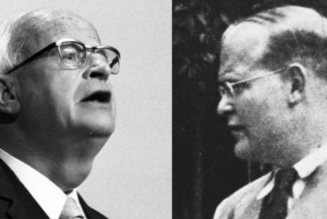
It is fully accepted that junk food tastes good but isn’t good. Its bodily effects may teeter into immorality when we consider how it harms our health, and how preserving our health for the sake of others is no small matter. Fat fathers (and I’m not lightweight here) deal with that nagging realization that if they were to face death due to being overweight it would not be light on their conscience – especially if they could have just cut out the junk and live longer.
What if our habits of reading (or not) and scrolling (or not) were weighed similarly? There’s good reason that they should.
The Brain is Muscle
Like other parts of the body our brain is a muscle that physically changes based on how it is used – or isn’t. The mind is immaterial – it is a power of the soul – but it works upon the physical reality of the brain. We wrongly think that the brain doesn’t develop beyond childhood, but the brain’s makeup is more agile than we think. Scientists call this agility “neuroplasticity,” which means the brain physically changes to accommodate what is asked of it. Different parts of the brain regulate and make possible different forms of thought and even action. Just as a muscle may grow in strength or weakness based on what is asked of it – resistance or ease – so too parts of the brain grow in strength and weakness.
Different Strengths
Steven Johnson, author of Everything Bad is Good for You, argues that the heightened stimulation of the brain via internet use is good for you. He points out that the brain of computer-users versus book-users is very different, the former activating many different parts of the brain in order to take in all that’s being presented. Internet use is akin to the heightened senses of the hunter or warrior – constant scanning of the horizon and info-processing to look for dangers and opportunities. “[Reading] books,” Johnson concludes, “chronically understimulates the senses.”
Nicholas Carr disagrees, and anyone who thinks that prayerful meditation, lectio divina, the Rosary, etc. are important too. In his book The Shallows: What the Internet is Doing to Our Brains, Carr challenges Johnson’s interpretation of the data. It is the very fact that the brain is more settled while reading that reading is so “intellectually rewarding.” “By allowing us to filter out distractions, to quiet the problem-solving functions of the frontal lobes, deep reading becomes a form of deep thinking,” says Carr. “The mind of the experienced book reader is a calm mind, not a buzzing one… it’s a mistake to assume that more is better.”
Reading and focused thought (picture someone reading in an armchair or someone praying their Rosary) blocks out distraction for the sake of depth and to sit with the truth itself. UCLA professor Gary Small discovered that it takes a very short amount of time to alter the brain in ways that make deep reading harder. He actually measured the “conversion” of book-users to internet-users: “After just five days of practice, the exact same neural circuitry [that was present in internet-users] in the front part of the brain became active in the Internet-naïve subjects [in whom it was not active before the internet use].” In other words, just an hour a day for one workweek re-wired the brains of those archaic book worms.
Wired Poorly for Prayer
When our brains are “wired” for regular screen-usage the unavoidable result is that we are less able to read deeply. I speak here from knowing experience. My work and life often drives me to a screen, and I can feel—and it feels physical —that it becomes harder to concentrate on a book after hours online.
This is alarming because the collective wisdom of Catholic culture ceaselessly points to our use of books to learn, contemplate, and pray with the truth. When God became Incarnate, it was the Word that was made flesh. Our rituals and ceremonies have rubrics for the movement and use of books. Our names are written in a book of life. Our monasteries are said to have preserved classical learning and birthed an entire culture after the collapse of Rome precisely in their preservation of books and learning. All monastic rules presume upon the ability to read or the willingness to learn. Even the ”natural revelation” from creation itself is often called by the saints “the book of nature.” Our most treasured and recommended forms of prayer are in those methods that still the mind and dismiss distractions from our presence. Sacred Scripture, our treasure and endless source of contemplation, is an infallible Book.
Now, we know that prayer leaps from pages into contemplation—we go beyond the book. But the book is foundational to contemplation. If, like me, you go through a drought in your prayer, mystics like St. Teresa of Avila reminds us of the great value of books to keep us grounded and on the right track in prayer. In fact, if we find ourselves scatter-brained and unable to enter into deep prayer alone, we should look to reading first:
Reading is very helpful for recollection and serves as a necessary substitute – even though a little may be read – for anyone who is unable to practice mental prayer… In all those years, except for the time after Communion, I never dared to begin prayer without a book… [Without a book] my soul was thrown into confusion and my thoughts ran wild. With a book I began to collect them, and my soul was drawn to recollection.
As scripture says, God is in the still, small voice. It seems that the muscles of our brain can be trained to be able to hear this small voice, or it can be overwhelmed and stimulated to make it harder to listen. Contrary to the stimulation of screens, reading not only helps to still the mind and quiet distractions, but in so doing it helps us ascend from reading to contemplation, from earth to heaven.
What if Reading is Not a Habit?
If this is true then we can think of our daily habits of reading as we might think of working out in a gym. If sitting at a desk can atrophy the muscles and require the counterbalance of a workout in the gym, so too does “training” the mind on the screen makes it more necessary to train the mind for prayer by reading. If St. Theresa found it necessary to “settle” the mind with a book, imagine how much more we need it in our world of overstimulation! We may know this intuitively to be true, but thinking of the physical muscle of the brain should make it less ethereal and more urgent to us.
This is part of the reason we started the book and print service of Sword&Spade magazine. Magazines that are intellectually stimulating and have a simple layout (i.e. not saturated in ads and visual chaos) can be a sort of “bridge” from the hyper-activity of a website and the hyper-focus of a book. Magazines often have reviews of books and shorter presentations of ideas that are stimulating without requiring what might seem like excessive investment of time. Magazines also have some of the “quick meals” that we might think an internet article can provide, but they also have an end, a time to set it down and move on. Scrolling, by contrast, is endless like a trance or spell.
Another tactic for training the brain, especially if you’re flabby in the reading area, is to begin with literature instead of non-fiction. Often the internet drives us to the “facts” and “data” of something, which makes life seem as if it can be boiled into the objective of truth and absorbed best that way. We men often look askance at literature because, you know, non-fiction gives you something useful and true. However, there’s a reason C.S. Lewis practically gave up on reasoned essays and started writing books like The Chronicles of Narnia – a story can cultivate noble thought and sensibilities in ways that avoid our prideful demand of reality that it, as the old Dragnet show put it, “just the facts, ma’am.” We often bemoan the fact that the architects of so much modern errors “own the narrative” of what’s happening in the world. Perhaps because they understand the power of the story better.
Salvation is a story. Jesus taught in parables. Nations are built on their stories. Families our bound by their stories. Stories have a way of drawing out wondering attention in and teaching us things that we can learn in no other way. A good work of literature can also take hold of a wandering mind in ways that non-fiction can’t, so if the goal is to get a good workout, start with a good story.
When’s Your Workout?
I recognized that the combination of the Covid phenomenon and my own lack of discipline have taken me away from my former habits of reading. I am aware that, like junk food does invariably, this will eventually catch up to my ability to be healthy. As a Christian I understand that this means my scattered mind will have a harder time with prayer. Therefore, I must make a workout plan. Potato chips just taste so good, and Netflix just magical knows what I want to watch. The internet will always be the tastier treat, but it will never satisfy like deeper reading will. And, I think most of us can confirm from experience what the science proposes: to pray better we need more reading in our lives.
Like anything worth doing, it is harder but better to train and move toward what is good, even if the chemically engineered “natural flavors” seem like they taste better. Scripture says to find what is good and “meditate on these things.” That’s in Philippians chapter four. Maybe start a new workout now and go look that chapter up.
✠
This article was originally produced for Sword&Spade subscribers.
image: The Theological Hall, a baroque library in Strahov Monastery (Prague) by frantic00 / Shutterstock
Join Our Telegram Group : Salvation & Prosperity








